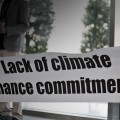Bonn: Mind the Gap
Kate Yoon | June 9, 2015.
Monday offered a fresh start to the United Nations climate change conference in Bonn having resumed after a Sunday hiatus. Unfortunately, it did not pick up in pace as many had hoped.
Stocktaking in the Ad-Hoc Working Group on the Durban Platform for Enhanced Action (ADP) meeting was in many ways a replay of previous discussions. Delegates expressed a strong desire to move forward, but realistic barriers were noted. Countries such as the United States and the United Arab Emirates, and groups such as the European Union suggested again that the chairs take initiative in streamlining the text. The chairs stated that they were “overwhelmed” by parties’ willingness to proceed quickly, but also doubted that parties would unconditionally accept their revisions. They also called for patience and understanding: one of the co-chairs of the ADP reminded delegates to “keep in mind that the Secretariat are human beings.” Given previous reactions to ‘initiative’, it is no surprise that the co-chairs are reluctant to comply.
Meanwhile, climate made it to the forefront of the Group of 7 (G7) talks. The G7 summit, which took place from June 7 until June 8 in Bavaria, Germany, concluded with a commitment to keep warming below 2°Celsius. G7 leaders reached an agreement that includes increasing climate finance and supporting renewable energy. This was taken as a token of goodwill, and as a signal to phase-out fossil fuels.
However, some remained skeptical, noting the lack of concrete steps that should have been laid out. Tim Gore, Oxfam policy lead on climate change, said: “G7 leaders still aren’t spelling out how they will keep their US$100 billion promise [to the Green Climate Fund] by 2020. Developing countries need a credible financial roadmap, not a set of accounting tricks.”
Setting targets will not automatically lead to reductions; nonetheless, this agreement gave a strong message that decarbonisation (and support for developing countries to do the same) was a priority item in the G7’s agenda.
Back in Bonn, delegates and experts discussed support for developing countries in Reducing Emissions from Deforestation and Forest Degradation (REDD+). Delegates pushed to move beyond theoretical discussion to more concrete cases. “It would be interesting to have more space for countries who are implementing the Warsaw framework to discuss their challenges,” a delegate of Brazil said. “In these meetings what we see is the negotiators, and not the people who are implementing REDD+ on the ground.”
Others expressed frustration that the Warsaw framework was often not directly relevant or applicable to national situations. Panama, speaking on behalf of the Coalition for Rainforest Nations, called for a stronger focus on “substantive issues” rather than theoretical debate. Delegates requested details on financing mechanisms, but the financial institutions (that had presented earlier in the session) were nowhere to be seen.
Similar gaps in theory and practice were noted between climate change science and policy-making. In a session that dealt with reconciling the two, Hong-Sang Jung of the Korea Meteorological Administration noted the: “gap between the Intergovernmental Panel on Climate Change (IPCC)’s work and the real world.”
Dr. Brian Flannery of Resources for the Future shared his thoughts on the IPCC shortcomings: “People talk to people, but policy is made through institutional arrangements. IPCC reports do not talk to anyone and lack information and perspectives that are relevant to national circumstances.” He stressed that for relevant knowledge to reach the levels where it can be implemented, it must be communicated in national-level policymakers’ language.
Is it really the thought that counts? In climate negotiations, probably not. Even with a heightened morale, moving beyond vague promises to concrete, actionable steps proves challenging.
Photo: UNFCCC
The Verb will be on the ground in Bonn to cover the UN climate change conference as it unfolds over 1-11 June 2015.













comment